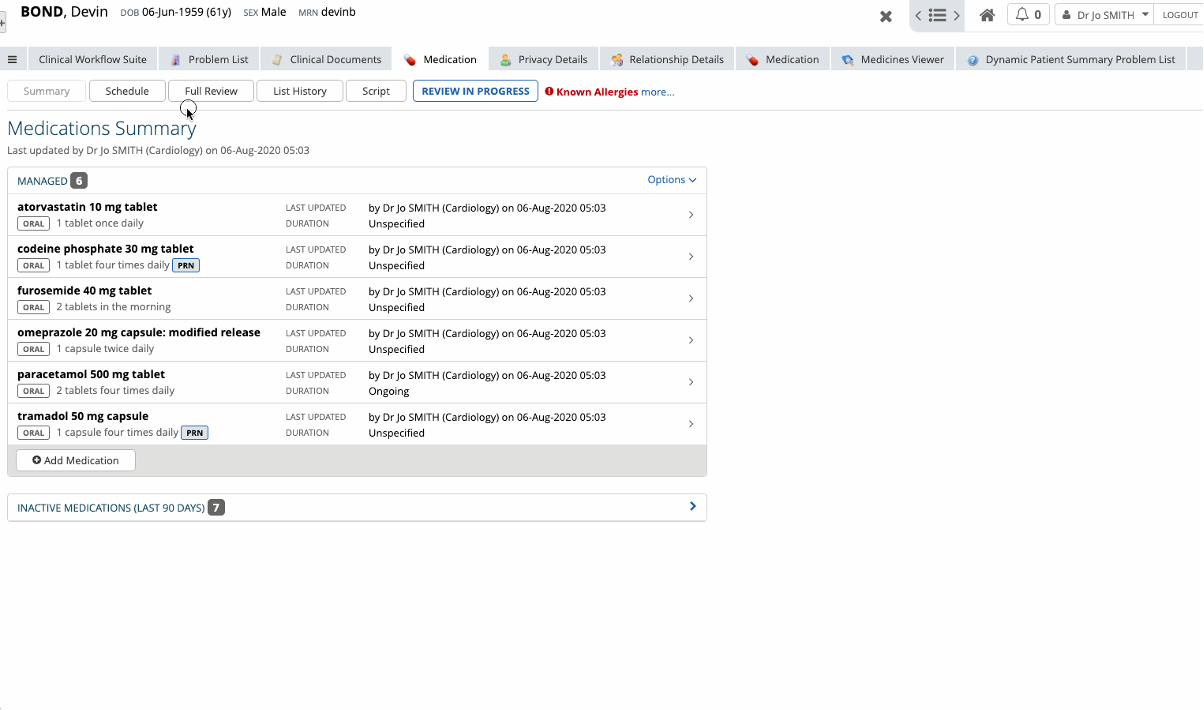Medicines management is a hot topic in healthcare, as organisations look to make sure their clinicians have access to a complete and up-to-date medication record to improve safety, speed up discharge, and support integrated care.
In the first of a series of customer webinars, product specialist Aaron Jackson outlined how Orion Health Medicines can be used to address these issues, and how developments to the platform have been given new urgency by the coronavirus emergency.
Orion Health Medicines
Orion Health Medicines is a platform for aggregating prescription data from multiple sources, from where it can be presented to users as a consolidated medication list or timeline or made available to other systems, including Orion Health products designed to support care co-ordination and patient engagement.
The aggregation is extremely complex, but Orion Health has developed a Medicines Viewer to help users take-in a patient’s medications “at a glance” and then drill down for more detail when required. Clinicians can choose to search, filter and group the information in different ways to support a variety of use-cases and care settings.
As Jackson explained: “The value [of Orion Health Medicines] lies in enabling people to reconcile medicines information from disparate sources and to use it for patient care” and the value of the Medicines Viewer’s features lies in “helping clinicians to find information quickly and to make sense of it.”

FHIR-ing up integration
Orion Health is a strong supporter of open standards in healthcare, so Orion Health Medicines naturally supports SNOMED-CT medication terminology and HL7 FHIR application programming interfaces.
In the webinar, Jackson outlined how this had enabled participants in a recent INTEROPen hackathon to meet a challenge set by Andy Hadley, solution architect at the NHS Dorset Clinical Commissioning Group.
Hadley, who is also solution architect for the Wessex local health and care record exemplar, wanted a single medications record that could track any changes that were made while a patient was in hospital and package the information into a discharge summary.
Over the course of two days, participants at the virtual event were able to achieve this by using FHIR interfaces to pull data from local GP, hospital, e-prescribing and pharmacy systems into a consolidated list that could be ingested by the electronic record systems.
“We really focused on the question of how to create a single medication record, and on building one using our medicines product,” Jackson said. “Getting this kind of information from third party systems is a challenge, but… we were able to create a current medications list that other systems could consume.”
Orion Health is now creating a ‘consolidated medication list’ API that will be available with the next release of Orion Health Medicines, which is due in October.
Medicines challenges made sharper by Covid-19
The hackathon was held to tackle the common problems of junior doctors spending hours piecing together the medication history of patients admitted through A&E, and GPs receiving late or incomplete discharge letters from hospitals.
But the importance of obtaining a full list of a patient’s medications has taken on a new urgency during the coronavirus pandemic, because it can help clinicians working under huge pressure to work out whether their symptoms are due to Covid-19 or have other causes.
Creating fast and complete discharge summaries is also a priority for the NHS, as it focuses on clearing waiting lists and coping with demand this winter. In the webinar, Jackson said post-Covid priorities are being fed into the Orion Health Medicines roadmap.
Alongside the ‘consolidated medication list’ API, the next release will include an immunisations list or consolidated record of any vaccines and immunisations administered to a patient.
Jackson explained: “With an expanded flu jabs programme this winter, and Covid-vaccination on the horizon, immunisations need to be part of the Medicines Viewer; and that will also be available from October.”
On a longer timeframe, Orion Health is also exploring ways to enable patients to add information about over-the-counter medications to the system, because these are “a key piece of missing information at the moment”, and at enabling patients to correct or add notes to the record.
Medication Management: from meds reconciliation to virtual clinics
Jackson concluded the webinar with a tour of another add-on to the Medicines solution, Medication Management, and another product to use similar thinking, Problem and Allergies, which creates a consolidated view of a patient’s ‘problems’ and how professionals are dealing with them.
Medications Management is “a set of smart widgets to drop into workflows” that make it easier to handle complex medicines tasks, such as prescribing and discharge. It has been used by NHS Greater Glasgow and Clyde to support medicines reconciliation and to help generate electronic immediate discharge letters since 2019, but it is another feature of Orion Health Medicines that can help organisations in the post-Covid world.

Jackson demonstrated how the prescription widget can support prescribing in new settings, such as the virtual clinics that so many healthcare organisations have set up so they can support patients while keeping them and their staff safe at home whenever possible.




